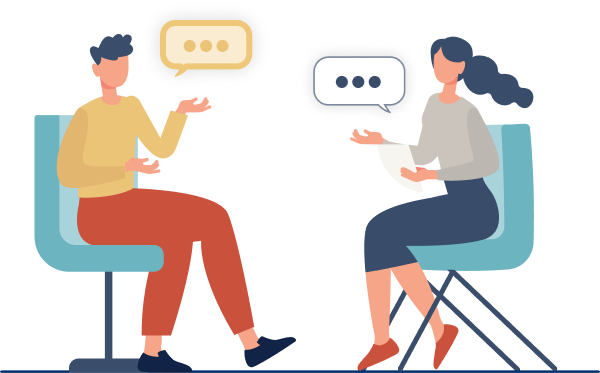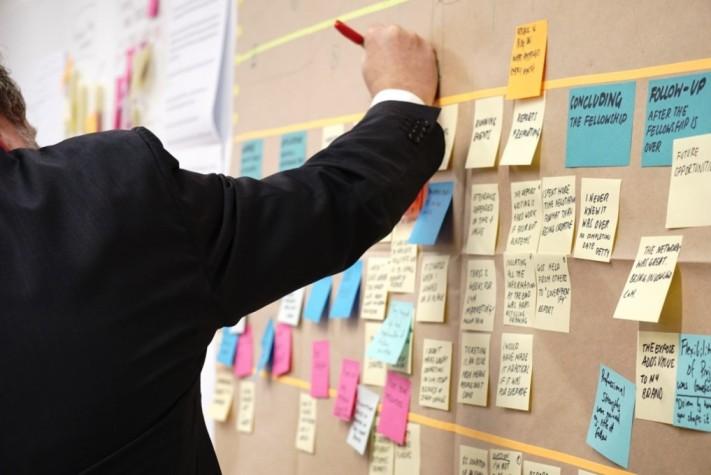Top 13 communication skills for a CV and how to improve them
Communication skills are essential for expressing yourself, actively listening, and engaging with others in and out of the workplace. They’re essential at every career stage, from entry-level to senior management. Demonstrating them on your CV will make you more attractive to employers across all industries.

Our customers have been hired by: *Foot Note
Communication skills are a valuable asset in any workplace. They make it easier to build relationships with colleagues, encourage collaboration, and contribute to an overall positive working environment. A good example of interpersonal skills at work is listening and engaging with others during meetings, which helps build trust and cooperation.
Some communication skills – such as making small talk or active listening – come naturally to many people, but it’s also possible to develop them over time. Whether innate or acquired, communication skills can help you feel more successful and increase your sense of belonging at work.
In this article, we’ll look at different types of communication in the workplace, show you how to improve communication skills, and provide examples of CVs that demonstrate these skills when recruiting. By the end, you’ll have all the insights you need to improve your workplace communication skills, and you’ll be able to use our intuitive builder to showcase your top communication skills on your CV.
Ready to present your communication skills to recruiters? Browse our library of professional CV templates to find a design that best highlights your strengths and helps you showcase your communication skills on a CV.
What are communication skills?
Communication skills are a combination of verbal and non-verbal interpersonal abilities that significantly impact the flow of information between you and other people. These skills determine how easily you establish and maintain relationships, making them essential in both personal and professional settings. In the workplace, communication encompasses different interpersonal skills that help you connect with people (managers, colleagues, clients, and so on) and work together effectively.
Due to their importance, strong communication skills are what many recruiters and employers look for in candidates. They will often ask interview questions that demonstrate or test your communication skills.
Communication skills typically come in four catergories:
- Verbal communication: Verbal communication is how you use words to convey messages, both spoken and written. Examples of verbal communication skills include abilities such as public speaking and engaging in everyday conversations.
- Non-verbal communication: This form of communication relies on gestures, facial expressions, body language, and other visual cues. Its role is to help you express thoughts and feelings without words.
- Visual communication: Visual communication includes using elements like images, charts, or graphs to convey information. This is particularly important in presentations and reports.
- Written communication: Although it can also be classified as a type of verbal communication, it’s useful to distinguish the importance of written communication. It involves conveying ideas through written words, such as emails or memos.
It’s also possible to categorise communication skills based on the setting in which we use them, for example:
- Formal communication: These interactions occur through formal channels, either vertically (between managers and employees) or horizontally (between departments or teams).
- Informal communication: Informal communication refers to the unofficial flow of information, often through rumours or casual conversations. Messages shared via this form of communication spread quickly but may be less reliable.
- Unofficial communication: This is the most casual communication form and usually takes place outside the workplace. Examples of communicating unofficially include social interactions between employees over lunch or on a team outing.
Tip: Recruiters won’t only judge you based on your answers, but also your questions. Prepare for a job interview by learning what the best questions to ask the interviewer are.
Top 13 communication skills at work
Communication is a broad umbrella term consisting of many interrelated elements. Mastering these components will enable you to interact more effectively, not only in the workplace but also in your personal life. It will also improve the quality of your interactions, enhance your performance, and even improve your chances of being hired.
After all, your CV, cover letter, and job interview require you to demonstrate these interpersonal abilities. Below is a list of key communication skills and their definitions, along with examples you can use to showcase them in your professional profile.
Active listening
Conflict resolution
Giving and receiving feedback
Public speaking
Empathy
Persuasion
Adaptability
Confidence
Storytelling
Strategic questioning
Cultural awareness
Body language
Patience
Communication skills: CV examples
As you already know, communication is one of the key skills to write on CV, but its importance varies between professions. In some industries, like sales, it’s close to impossible to build a long-term career without knowing how to communicate effectively with people, both verbally and non-verbally. In other fields, like programming or data science, employers are more likely to expect that you demonstrate strong written communication skills.
When writing a CV, it’s common to list six to eight key skills in the skills section, often including a broad term like “communication skills” without much detail. However, both your CV and cover letter are your first opportunity to demonstrate your communication skills, particularly in writing. Use the skills section and your CV’s personal statement to highlight your communication strengths and make a strong impression.
Below, you’ll find role-specific examples of communication skills and how they are useful in the workplace.
Communication skills in social work
Social workers rely heavily on communication skills. These interpersonal abilities help them understand clients’ needs, build trust, and guide them through difficult life situations. Below are key communication skills for a social worker CV:
- Active listening
- Empathy
- Clear verbal communication
- Non-verbal communication
- Conflict resolution
Communication skills examples for a teacher
Teachers use communication skills to convey information, engage students, and create a supportive classroom environment. Here are key communication skills for a teacher’s CV:
- Giving constructive feedback
- Public speaking
- Visual communication to use charts, graphs, images
- Choosing the most appropriate and effective medium of communication for the audience
Communication skills examples for a branch manager
Branch managers use communication skills to manage teams, improve workflows, and ensure that operations run smoothly. Clear communication is essential for delegating tasks and keeping the team motivated. Below are useful communication skills for a branch manager CV:
- Delegating tasks to maintain efficient workflow
- Monitoring the performance through reports
- Mediation and problem-solving
- Body language to observe others’ behaviour and control your own gestures and movements
- Ability to establish and maintain an authoritative position within the team
Communication skills examples for a personal assistant
Personal assistants use their communication skills to manage schedules, interact with clients, and keep things running smoothly for them. These interpersonal abilities help them organise information and ensure tasks are completed on time. If you’re thinking about pursuing a career in this field, here are some key communication skills to include on your personal assistant CV:
- Excellent phone etiquette
- Good command of the spoken and written language
- Proficiency in minute-taking
- Networking
- Reporting
Communication skills examples for a receptionist
Receptionists are the first point of contact for customers and visitors, so their communication skills are critical to creating a positive first impression. Strong communication skills help them manage requests, answer questions, and provide exceptional customer service. Communication skills you’re likely to find on a receptionist CV include:
- Ability to provide clear, precise information
- Proficiency in providing and receiving information by phone (for example booking details)
- Active listening
- Patience and friendliness
- Good writing and editing skills to manage professional mail
Communication skills examples for a babysitter
Babysitters rely on strong communication skills to interact with children, parents, and other caregivers. Effective communication helps them to create a safe and engaging environment for children. The key communication skills for a babysitter include:
- Active listening
- Ability to adapt the message to the age of the recipient
- Mediation and negotiation
- Non-verbal communication
- Objective, constructive feedback
How to improve communication skills in the workplace

Strong communication skills don’t come naturally to everyone. While some people, like extroverts, find it easy to strike up conversations (even with strangers!), others may find the idea intimidating. The good news is that these skills can be developed over time. After all, communication isn’t just about talking; it’s also about listening, understanding, and adapting to different situations.
Here are five key steps to help you improve your communication in the workplace:
STEP 1
Prioritise listening
Effective communication usually begins with active listening. To prioritise listening, focus on the speaker to make sure you understand their message. Rather than just waiting for your turn to speak, respond thoughtfully.
For example, you can practise paraphrasing what you’ve heard to ensure understanding. You may also use non-verbal cues (such as nodding or maintaining eye contact) to show engagement during conversations.
STEP 2
Learn to recognise and control your emotions
Emotions play an important role in how you communicate. Stress, frustration, or excitement can all affect the tone of your voice and the clarity of your message. By developing emotional intelligence, you can learn to manage your reactions and remain calm in challenging situations. This will also help you avoid misunderstandings and lead professional, constructive discussions.
STEP 3
Don’t neglect feedback
Whether we like it or not, communication is a two-way process, and feedback is vital in ensuring clarity and improvement. Be open to constructive criticism, and don't hesitate to ask for clarification if something is unclear.
At the same time, practice giving feedback. To do that well, be direct but supportive. Make clear suggestions that help others improve while maintaining their confidence and motivation.
STEP 4
Adapt your message to the audience
Always adapt your language to your audience. After all, you'll communicate different levels of detail depending on whether you're talking to a colleague, a client, or a manager. Being able to adapt your communication style ensures clarity and avoids misunderstandings.
STEP 5
Accept that it’s a process
Like almost everything else in life, communication takes time and practice to improve. Remember, you won't become an expert at communicating with others overnight, but if you're consistent, you'll certainly make progress.
Pay attention to how others communicate, learn from your experiences, and remain open to self-improvement. The more you practise, the more confident and effective you'll become in your interactions at work.
The importance of communication skills
If you’ve ever wondered why communication skills are important in the workplace, this section explains their significance.
Communication skills are important because they allow us to exchange information clearly, both when sending and receiving messages. These skills are crucial in any professional environment, helping teams to work together, meet deadlines, and support each other. Imagine a workplace where communication is scattered and inconsistent – it can quickly lead to misunderstandings and a drop in overall team performance.
Therefore, communication skills are crucial on several levels:
- Establishing working principles: Communication ensures that work rules, responsibilities, and objectives are clearly defined and understood.
- Maintaining workflow: Clear communication improves task delegation, progress tracking, and reporting. It ensures that deadlines are met and expectations are managed.
- Fostering a good working environment: Honest and open communication fosters positive relationships, boosts team morale, and prevents unnecessary conflict.
- Ensuring safety: Effective communication of safety protocols, whether verbal, written or non-verbal, ensures a safe and compliant working environment for all employees.
Communication skills: interview questions
Recruiters often assess your communication skills during a job interview by asking how you handle workplace interactions, resolve misunderstandings, or adapt your style. Here are three common questions with sample answers to help you prepare:
Can you describe a time when you had to explain something complex to someone?
In my previous role, I often had to explain technical concepts to customers who had little knowledge of the industry. For example, when presenting a new software solution to a client, I broke down the features using simple language and real-world examples. I also encouraged them to ask questions to ensure they fully understood the product.
How do you handle conflicts or misunderstandings at work?
If there’s a misunderstanding, I listen carefully to identify the problem and clarify expectations. One time, a colleague and I had different interpretations of a deadline. I addressed this immediately, aligned our understanding, and suggested a shared tracking system to prevent future misunderstandings.
How do you adapt your communication style when talking to different people?
I always tailor my communication to the audience. When speaking to senior executives, I focus on key insights, while with my team, I provide detailed explanations and encourage discussion. Adapting my approach ensures that my message is clear and effective.
Good communication skills - key takeaways
- Communication skills are essential for building relationships, fostering collaboration, and maintaining a positive working environment.
- In addition to verbal and written communication skills, good communication also requires that you invest in your ability to communicate through visuals and non-verbal cues.
- Adapting your communication style to different audiences improves clarity and effectiveness in professional interactions.
- Employers assess your communication skills during every stage of recruitment, including during job interviews.
- Improving communication involves developing active listening skills and emotional intelligence; it also requires ongoing practice.

Olga Knapinska
Content writer
*The names and logos of the companies referred to above are all trademarks of their respective holders. Unless specifically stated otherwise, such references are not intended to imply any affiliation or association with myperfectCV.











